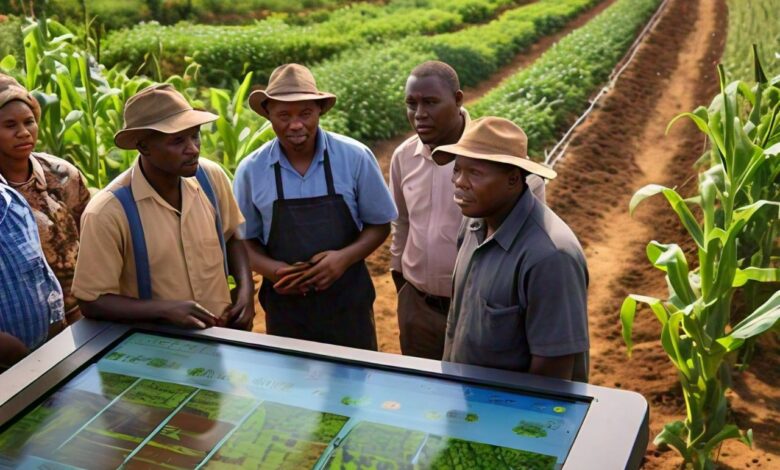Innovative ICT Solutions Transform Zimbabwe’s Agriculture Sector

In recent years, Zimbabwe has witnessed a significant shift towards leveraging Information and Communication Technologies (ICTs) to boost its agricultural sector. This transformation is set to revolutionise farming practices. It will also increase productivity and enhance the overall efficiency of the industry. Therefore, let’s delve into the innovative ICT solutions that are making waves in Zimbabwe’s agriculture landscape.
Smart Farming: The Future of Agricultural Productivity
Smart farming, powered by cutting-edge ICT solutions, is becoming increasingly popular among Zimbabwean farmers. This approach combines traditional farming techniques with modern technology to create more efficient and sustainable agricultural practices. By utilizing IoT sensors, drones and satellite imaging, farmers can now monitor crop health. Additionally, they can detect early signs of pests and diseases as well as optimise irrigation systems.
According to a report by the University of Zimbabwe’s Department of Agricultural Engineering, “smart farming has led to a 20% increase in crop yields and a 30% reduction in water usage compared to conventional farming methods.” This significant improvement in productivity is expected to contribute substantially to Zimbabwe’s food security goals.
Mobile Applications: Bridging the Gap Between Farmers and Markets
Furthermore, mobile applications are playing a crucial role in connecting farmers directly with consumers and buyers. Platforms like EcoFarmer are providing farmers with real-time market prices. Moreover, it is enabling them to sell their produce at optimal rates. These apps also offer weather forecasts, crop management tips and access to financial services. This makes it easier for farmers to manage their businesses effectively.
Also, EcoFarmer designed by Econet, is a mobile platform that reaches smallholder farmers and provide them with a suite of services.
Digital Payment Systems: Simplifying Financial Transactions
Additionally, digital payment systems are streamlining financial transactions in the agricultural sector. Services like EcoCash, operated by Econet Wireless Zimbabwe, are facilitating easy transfers of funds between farmers, traders and suppliers. Also, this innovation has reduced transaction costs and eliminated the need for physical cash handling. This is especially beneficial in rural areas where banking infrastructure may be limited. Also, this is an example of digital technologies for agriculture.
Precision Agriculture: Tailoring Farming Practices to Specific Needs
Also, precision agriculture, made possible through advanced ICT solutions, is allowing farmers to tailor their farming practices to specific crop needs. By using GPS-guided tractors and drones equipped with high-resolution cameras, farmers can now apply fertilisers and pesticides. This is precisely where they’re needed most, reducing waste and environmental impact.
Additionally, three first-year students from the National University of Science and Technology (NUST) achieved global recognition for developing an innovative smart agriculture irrigation system.
The system aims to promote precision agriculture. It leverages advanced sensor technologies to optimise the irrigation process. Therefore, it significantly reduces water costs while ensuring plants receive the optimal amount of water needed for their growth. This also shows that the nation is embracing smart farming.
E-Learning Platforms: Empowering Farmers Through Knowledge Sharing
Finally, e-learning platforms are playing a vital role in empowering Zimbabwean farmers with modern agricultural knowledge. Furthermore, these online resources provide access to educational materials, training courses and expert advice. This bridges the gap between traditional farming methods and cutting-edge techniques.
Zimbabwe Online Agricultural College (ZOAC) aims to increase the reach of Agricultural Education for Development to those who need it the most (farmers). It capitalises on ICT to ensure that farmers can learn from anywhere at their convenience. Also, courses are anchored on learning by demonstration, enquiry and practice as opposed to instruction. This shows digital technologies for agriculture in Zimbabwe as the way to go.
Conclusion: ICT Revolutionizes Zimbabwe’s Agriculture Sector
The integration of ICT solutions into Zimbabwe’s agriculture sector is transforming the industry in unprecedented ways. From smart farming techniques to mobile applications and digital payment systems. It is also helping with precision agriculture and e-learning platforms. Furthermore, technology is playing a pivotal role in boosting productivity, efficiency and sustainability in Zimbabwean farms.
As the country continues to embrace these innovative solutions, it’s clear that the future of agriculture lies in harnessing the power of ICT. With continued investment in these technologies, Zimbabwe is poised to become significant in sustainable and efficient agricultural practices in Africa.





